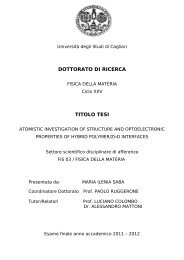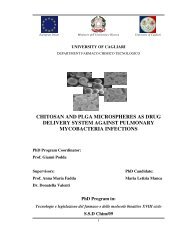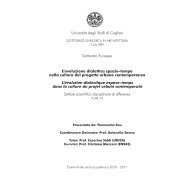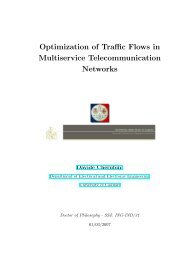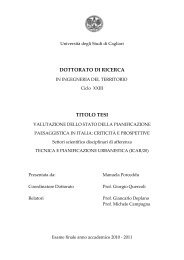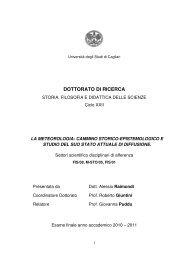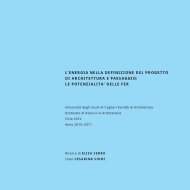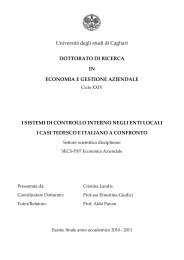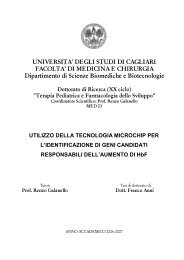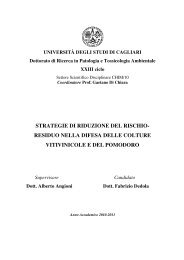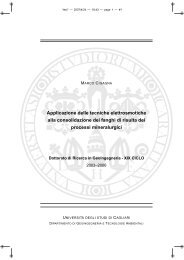The only truly alien planet is Earth. - UniCA Eprints - Università degli ...
The only truly alien planet is Earth. - UniCA Eprints - Università degli ...
The only truly alien planet is Earth. - UniCA Eprints - Università degli ...
You also want an ePaper? Increase the reach of your titles
YUMPU automatically turns print PDFs into web optimized ePapers that Google loves.
with nowhere to take its girlfriend for a bottle of wine and a dance <strong>is</strong> now rolling its jaws over an innocent<br />
and naive fiction that desperately needs to be left alone. […] We have enough intellectuals in Europe as it <strong>is</strong>;<br />
let the great USA devote itself to the spirit of the Wrights — bicycle mechanics and the sons of a b<strong>is</strong>hop. <strong>The</strong><br />
latter's modesty and exqu<strong>is</strong>itely plain prose style would be an example to you — especially h<strong>is</strong> restrained but<br />
heartfelt reflections on the death of one of h<strong>is</strong> sons, a model of the spirit animating SF at its best. But I fear<br />
you are trapped inside your d<strong>is</strong>mal jargon 94 .<br />
E così, nonostante le belle parole per il saggio di Baudrillard sull’America, sembra<br />
accogliere con una certa freddezza le sue considerazioni su Crash, che dice addirittura di non aver<br />
voluto veramente capire. Le altre r<strong>is</strong>poste ai due brevi saggi di Baudrillard, tranne una, sono volte a<br />
contrastare la sua lettura del romanzo, che viene considerata per lo più imprec<strong>is</strong>a e fuorviante.<br />
L’anno seguente, sulla stessa riv<strong>is</strong>ta, Nicholas Ruddick prende in esame la r<strong>is</strong>posta di Ballard,<br />
chiedendosi da dove nasca la sua ostilità alla critica di taglio postmoderno, considerato che tre<br />
critici su quattro esaltano questo suo romanzo, mentre l’altro attacca Baudrillard a prescindere da<br />
Crash e il suo autore. Condividendo l’idea che il filosofo francese abbia frainteso, e perfino<br />
d<strong>is</strong>torto, i contenuti del romanzo, ritiene che ciò che Ballard attribu<strong>is</strong>ce alla critica postmodern<strong>is</strong>ta<br />
lo pensi in realtà della lettura che Baudrillard dà del suo testo narrativo. Il problema di fondo è che<br />
il pensatore francese parrebbe utilizzare il romanzo come pretesto per confermare la sua teoria<br />
secondo cui l’iperrealtà avrebbe sostituito la realtà, e per farlo forzerebbe alcuni elementi del testo<br />
ballardiano per piegarli nella direzione da lui voluta. Secondo Ruddick invece non è in gioco alcun<br />
tipo di abolizione della realtà in quanto tale ma la liberazione di una realtà più profonda connessa<br />
con l’inconscio da parte della catastrofe narrata - in questo caso l’incidente automobil<strong>is</strong>tico -, che<br />
prima dell’occorrenza del quale si trovava in uno stato di latenza all’interno della piatta realtà del<br />
quotidiano. Si tratta di una tesi convincente, soprattutto nella m<strong>is</strong>ura in cui rivela, a partire dalle<br />
parole dell’autore stesso, una continuità di fondo di questo romanzo con le tematiche dei<br />
precedenti 95 .<br />
D’altro canto, nella speranza di non peccare di ingenuità, nonostante i rilievi mossi alla<br />
lettura di Baudrillard a me sembra legittimo interpretare un testo, come fa lui, anche in maniera<br />
eterodossa e d<strong>is</strong>cutibile, a condizione che non ne venga completamente stravolto il senso e non si<br />
affermi il falso, in virtù della natura fondamentalmente pol<strong>is</strong>emica dei testi narrativi, tanto più se<br />
94 J.G. Ballard, “A Response to the Invitation to Respond”, Science Fiction Studies n. 55, novembre 1991<br />
(http://www.depauw.edu/sfs/back<strong>is</strong>sues/55/forum55.htm) [Ultima v<strong>is</strong>ita 27/02/2011].<br />
95 «Ballard’s intention v<strong>is</strong>-à-v<strong>is</strong> Crash has been clearly, frequently, and lengthily expressed. He has stated, for example,<br />
that the novel was a logical outgrowth of h<strong>is</strong> ongoing project to expose the internal nature of catastrophe at both the<br />
cultural and individual level: “Crash! [sic] takes up its position as a cataclysmic novel of the present-day in line with<br />
my previous novels of world cataclysm set in the near or immediate future — <strong>The</strong> Drowned World, <strong>The</strong> Drought, and<br />
<strong>The</strong> Crystal World.” Crash!, of course, <strong>is</strong> not concerned with an imaginary d<strong>is</strong>aster, however imminent, but with a<br />
pandemic cataclysm institutional<strong>is</strong>ed in all industrial societies that kills hundreds of thousands of people each year and<br />
injures millions. Do we see, in the car crash, a sin<strong>is</strong>ter portent of a nightmare marriage between sex and technology?<br />
(“Some Words” 49).» Nicholas Ruddick, “Ballard/Crash/Baudrillard”, Science Fiction Studies n. 58, novembre 1992<br />
(http://www.depauw.edu/sfs/back<strong>is</strong>sues/58/ruddick58art.htm) [Ultima v<strong>is</strong>ita 28/02/2011].<br />
- 33 -



